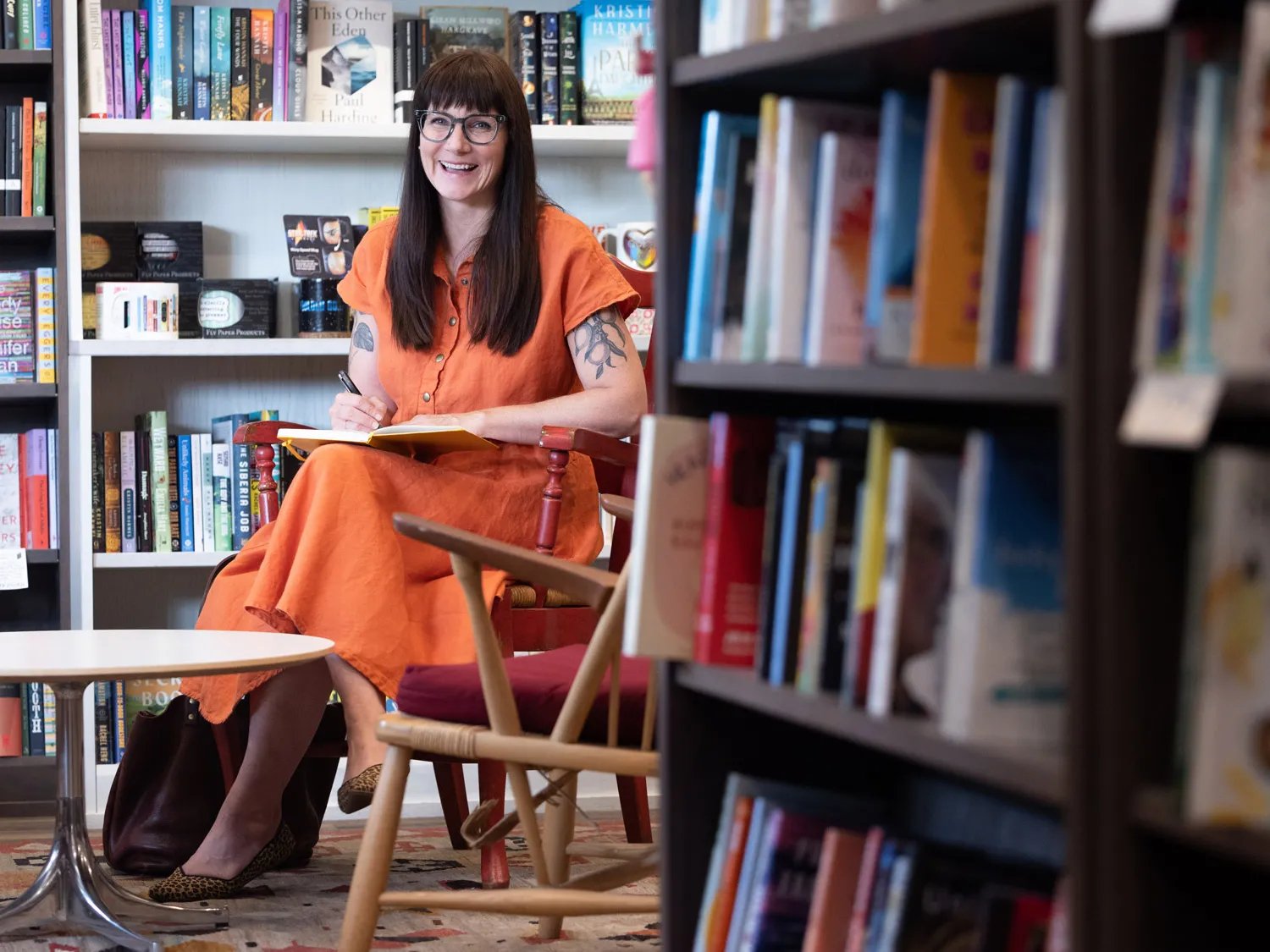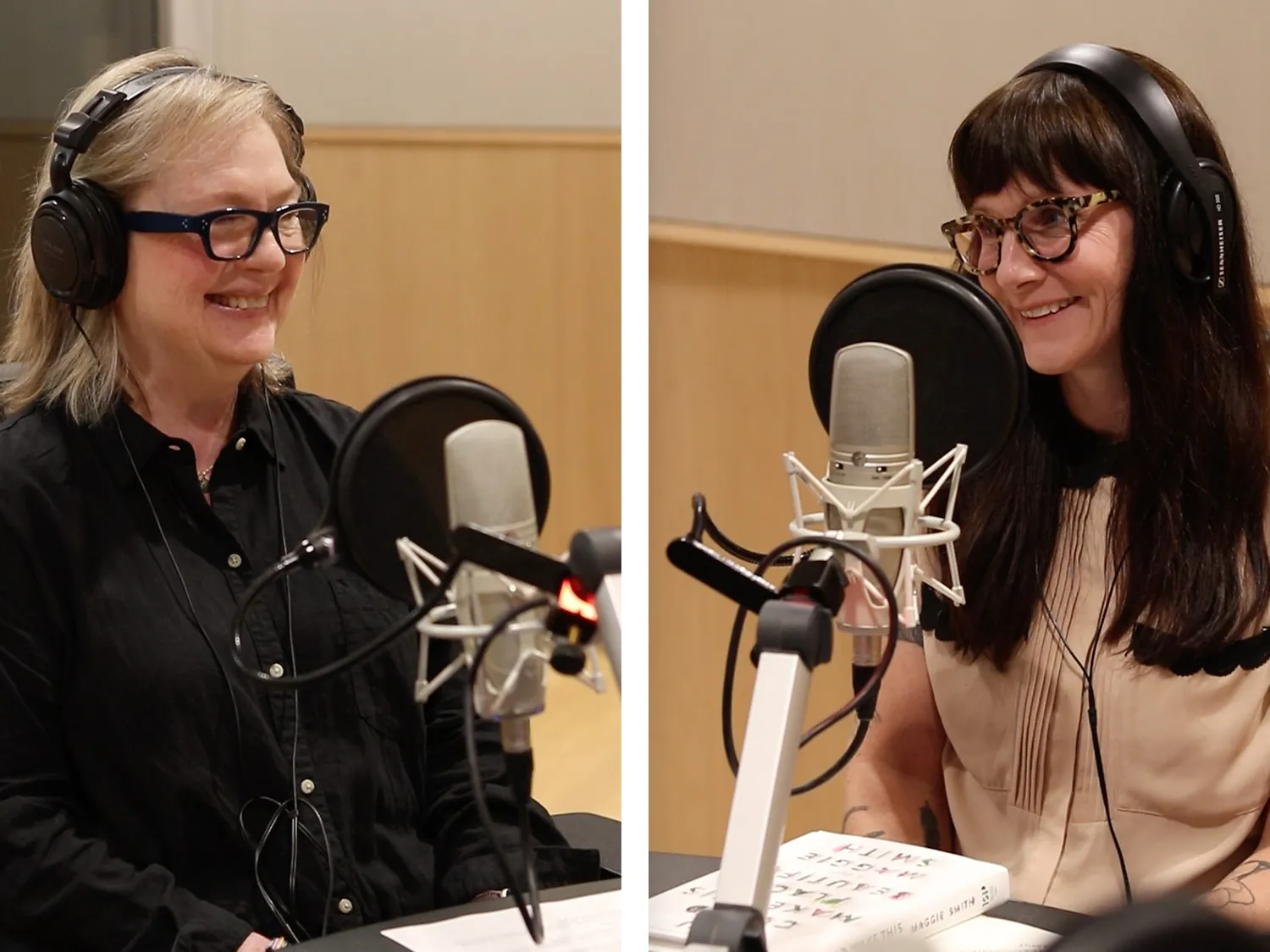

Maggie Smith in Gramercy Books in Bexley, Ohio (Photo by Jodi Miller)
Best-selling author Maggie Smith is baring her soul
In her new book, the poet and 2003 MFA graduate shares her pain and hope, inspiring readers again with the wonder of life.
Maggie Smith in Gramercy Books in Bexley, Ohio (Photo by Jodi Miller)
By Mary Alice Casey
As a teenager growing up outside Columbus, Maggie Smith ’03 MFA discovered her parents’ record collection, and along with it came her revelation that words could be a path to processing feelings and cementing experiences. Before long, the lyrics of ’60s and ’70s rock and Motown legends had inspired the novice works of this now-acclaimed poet and author.
Today, decades removed from those first days spinning albums, it’s Smith who is motivating us. Her works of poetry and prose offer solace and reassurance that hard times can be weathered. She is candid, too, in sharing some of her own hurdles.
Smith is pure Midwesterner. Her smile is quick and her generosity genuine. Family and friends — “my people,” she calls them, always with an emphasis on “people” — are nearby. They provide one community that helps her thrive. Another is her commonwealth of fellow writers and creatives, and they are everywhere.
This author of eight books shares a modest gray and white two-story, in a suburb east of Columbus, with her daughter and son. Her most recent publishing achievements have enabled her to keep the home, the only one the kids have ever known, after a divorce she hadn’t seen coming.
In You Could Make This Place Beautiful, Smith confides her impressions, disappointments and epiphanies as she moves on after that breakup. She was home folding laundry when she learned that the memoir, a collection of vignettes published in April, had landed at No. 3 on The New York Times Best Sellers list for hardcover nonfiction.
“I don’t want anyone to tell me anything about how my books are doing. It doesn’t help me make things,” Smith says. “So, it was a huge shock. In some ways, I think it’s the most poetic book I’ve ever written, which is a strange thing to say about a book of prose.”
Reviewers and readers agree about the poetic nature of Smith’s memoir — their applause has been deafening. From Time to Oprah Daily to the Chicago Review of Books. From bestselling authors to hundreds of reviewers on Amazon. They point to Smith’s mastery of words, her ability to get to the very heart of complex feelings, her relatability, her vulnerability, her way of portraying seemingly ordinary experiences as the extraordinary moments they are.
It’s that detail and authenticity Smith values most in the works of her favorite authors, and it is a true voice that she encourages more than anything in writers who follow her work and guidance. Those include fellow writers who attend her workshops and talks, former Ohio State students she knows from guest lectures and a 2016 visiting professorship, and subscribers to the newsletter she uses to stay connected to her language-loving community.
“Writing a poem about one thing that your 4-year-old son said to you once on a walk, that he could not have said to anyone else, that is the thing more people relate to than the universal,” she says. “The way to the universal is always through the particular.”
It was guidance from professors such as Kathy Fagan Grandinetti, a co-founder of Ohio State’s MFA Program in Creative Writing, that helped Smith find her own voice as a poet. Fagan Grandinetti revels in all of Smith’s books, including the national bestsellers Goldenrod, a book of poems published in 2021, and Keep Moving: Notes on Loss, Creativity, and Change, a collection of affirmations helpful to many readers when it arrived in 2020, seven months into the pandemic. Smith’s first picture book for children, My Thoughts Have Wings, illustrated by Leanne Hatch, is coming in February 2024.
“Maggie’s fluency, her facility with our language and mastery of metaphor open up wonder and meaning for readers,” Fagan Grandinetti says. “Her observations are our observations, but Maggie articulates them with clarity and a profound willingness to celebrate the highs, lows and in-betweens of this life.”
Resilience in Art and Life
The Now at Ohio State podcast explores how resiliency can be nurtured — and how it impacts our world — in conversations with Maggie Smith ’03 MFA and Jackie Hoying, assistant clinical professor in the College of Nursing.
Maggie Smith, on why to consider writing
As told to Mary Alice Casey
Whatever your purpose, whoever your audience, everyone can get something out of writing. You may be thinking, “Why does my story matter?” I still wrestle with that, particularly as a woman, as a mother, as a Midwesterner. Everything I publish is a way of pushing back against that feeling of insecurity. Your view does matter. It’s a gift and a lens through which someone else can process their own experiences. You can’t anticipate the impact that might have.
Perhaps you are writing for yourself. We have this habit of spiraling in our own minds, and it feels amorphous and messy. Voices in our head, particularly negative voices, can get very loud, and there is value in getting something off your mind and onto paper where you can work it out. It also can be incredibly meditative to take a long walk and write down what you see or to list things you’re grateful for.
You might consider writing for family. A lot of people do daily pages, and they’re processing and memorializing parts of their lives. Maybe no one sees it while you’re alive, but it’s something you’re doing to get to know yourself better, to understand your life. Maybe your children or grandchildren will someday read it and think, “Oh, that’s what their life was like.”
Do you want to send your writing into the wider world? Does it have greater artistic merit and the ability to touch people who don’t know you? I encourage you to find community — through writing resource centers, workshops, literary magazines. There’s value and beauty that can come from getting other people’s input and questions about your work. There’s also inherent danger: You might feel encouraged to appease every reader, and you may water down the work. I tell my students to always weigh the feedback they receive against their own vision for the piece.

The 2020 graduate met 1,000 strangers during a three-month cross country adventure. Here are 10 of his takeaways.

We asked an alum, two professors and a student which songs they would queue up for a summer drive. See what you think.

Howard M. Johnson found a bright future on a campus far from home. Now, he and his late wife are lighting the way for others.



